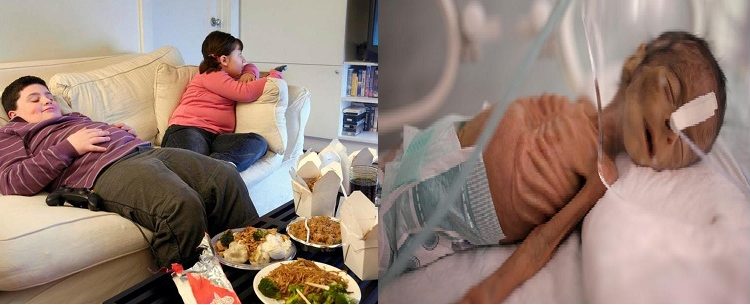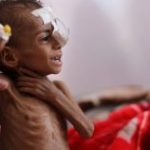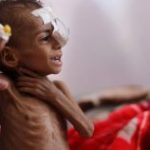SANAA, Feb. 25 (YPA) – Wars create always in its a way many tragedies and painful stories, not only with the death toll of civilians killed under the rubble of houses, in markets, streets and vital facilities; But it tends to harvest those who did not die in the air strikes; To kill them with hunger and malnutrition, and this is what has been happening in Yemen for seven years.
Yemen’s children, women and the elderly are paying a high price for the war waged by the Saudi-led coalition to date in Yemen, and all voices of international organizations, particularly the United Nations, are resounding to stress that Yemen is suffering from an acute food crisis and a lack of funding, which has made it at the forefront of countries threatened by “famine” in the modern era.
On the other hand, civilians and their children in the countries that participate in the aggression and the siege against Yemen, led by Saudi Arabia and the UAE, enjoy good health and immersed in a life of extravagance and luxury that has reached Gulf children and youth to the point of warning of excessive “obesity”, in addition to societal calls to reduce waste and extravagance in food, which reached record levels; While the people of Yemen suffer from hunger and unjustified killing.
While Arab countries are suffering from “starvation”, especially Yemen, Saudi Arabia goes ahead to rank first in the world in the list of “food waste” with alarming numbers, as the total cost of wasted food reached 10.7 billion dollars annually, according to the Saudi National Program for Loss and Waste Reduction, equivalent to 8 million tons annually.
UAE, is an important strategic ally of Saudi Arabia, did not stay away from the shocking numbers in the list of food waste annually, as it came second after the Kingdom and came fourth in the global ranking, which the total amount of garbage in the Emirates amounted to 2.7 billion dollars per year, in addition, the main reason for this Extravagance is the spending of large sums of money by Gulf citizens on buying food more than they need and exaggerating the establishment of parties and banquets that are filled with all kinds of foods.
These large numbers that offset by terrifying numbers of misery and hunger in Yemen, which have led to the high mortality rate of children suffering from malnutrition and the lack of health services due to the blockade, at a time when the Gulf countries are competing to spend on food and racing to accumulate garbage dumps, which constitutes a huge gap in which the simplest basics are absent of the justice, while the Yemeni children who are dying of starvation at the hands of neighboring countries that suffer from glut, and lack humanity.
Meanwhile, UNICEF Executive Director Henrietta H. Fore brought the tragedies of Yemen’s children to the table of the UN Security Council, and said, according to a realistic study of the pain of the poor deprived of their most basic rights, that a Yemeni child dies every 10 minutes due to hunger and disease.
Henrietta H. Fore indicated that the aggression on Yemen has led to the worst humanitarian crisis in the world, where 21 million people, including 11.3 million children, need assistance to survive, while about 400,000 children are suffering from malnutrition and facing the imminent risk of death.
In addition, the United Nations World Food Program (WFP) has warned that 13 million Yemenis are at risk of starvation and a lack of funding for humanitarian aid due to the protracted war waged by the Saudi-led coalition on Yemen.
WFP’s Executive Director, David Beasley, stressed that Yemen is “in a very bad situation”, with more than 40% of the population dependent on food supplies from the program, noting that the program provides food to about 13 million people in a country of 30 million people.
Beasley pointed out that the WFP was forced to halve food rations for eight million Yemenis due to the lack of funding. “Maybe we will reduce it to zero,” he asserted. “What do you think will happen? People will die, it will be disastrous.”
Since the start of the epidemic, more people are facing the threat of starvation globally, which puts more pressure on the WFP, he explained.
He added that 285 million people around the world are now at risk of starvation, making it even more difficult to meet Yemen’s needs.
“We have twice as many people struggling around the world right now, so what am I going to do for the children in Yemen?” Beasley wondered. “In Yemen, these children and these families have paid the price long enough for the war they are in. It’s time to put an end to this war.”
In a previous report made by the United Nations confirming that a Yemeni child under the age of five currently dies every nine minutes due to the war.
AA






